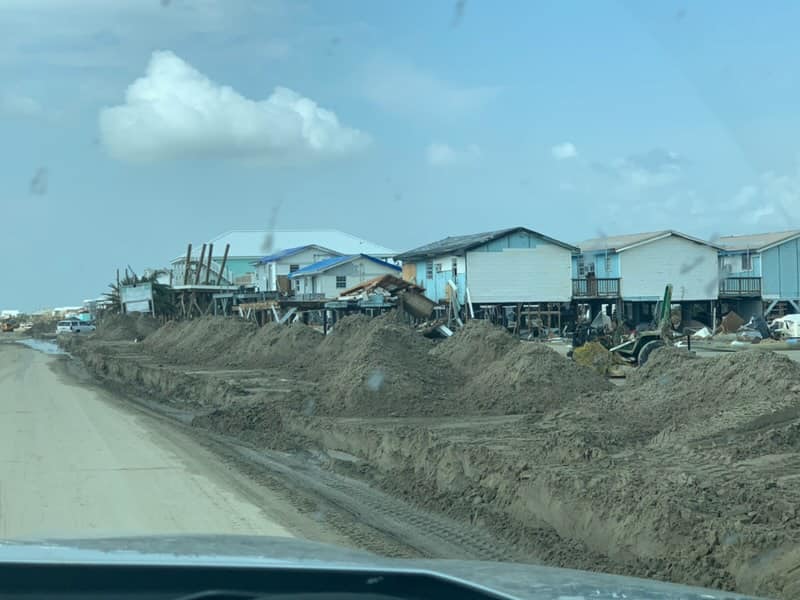
A mayor from Grand Isle, Louisiana likened the aftermath of Hurricane Ida to a detonated bomb as cities are left powerless for weeks.
Grand Isle is one of those badly hit by Hurricane Ida with 85% of structures damaged by its strong winds and record-breaking rainfall. What once was a picturesque "remote oasis" renowned for its "world-class fishing and birding habitat," now resembled a spot where a bomb exploded as "sand and debris" covered streets and structures forcing the local government to close it to the public and from its own residents.
It was a good thing Mayor David Camardelle enforced mandatory evacuation of the residents on August 27, two days before the storm landed.
"It looks like a bomb went off," Camardelle said in an interview with CBN News.
"We have no water, we have no electricity, we have no food," he added.
On Wednesday last week, local officials announced the closure of Grand Isle as assessments and clearing operations had to be undertaken from the storm's onslaught.
"As of now, the highway is covered with sand, hazardous debris, electrical poles and it's not safe to travel. National Guard is currently on the ground working to get the roads cleared. This will take some time as the levels of sand and debris is proving to be a big tasks to clear. Fema is on the island assessing the damages and working to get resources," the city announced in Facebook on August 31.
"As of now, no one will be allowed to enter on the island by land or water. We have no running water, gas, or electricity. We are asking for your patience while we try to get the island SAFE for passage. Tomorrow, we will update you with more information regarding our plan of action moving forward," the city added.
Local officials have been posting a daily update on the island's recovery while consistently notifying residents for days that they were strictly prohibited to return to their homes. Residents finally received the go-signal to return to their properties to assess the damage of the storm on Thursday, September 2.
Camardelle disclosed to Nola.com the island's damages include the burrito levee that "had been exposed and all the sand inside washed away," "large parts" of La.1 and other roads that were covered in sand, and "horrible" communications cutting off contact for almost 24 hours. As of now, the town is still in its "sand removal phase" as local officials work with FEMA and other agencies to get their "roads restored and allow for the community to travel in safely."
Hurricane Ida, which initially registered as a Category 4 storm, left Louisiana on Monday with 1 million customers powerless due to broken down electrical transmission lines. The entire cities of Baton Rouge and New Orleans were said to be totally without electricity for days. As of Friday, 900,000 people were reported to still have no electricity. The power outage is expected to last for another three weeks or so for areas hardest-hit by Hurricane Ida according to the state's senator, Bill Cassidy.
"Telling people it gets better when they're told they won't have electricity back until September 29th is cold comfort. So, in the meantime, we need gasoline so that people can run their generators," Cassidy told CBN News in an interview.
Cassidy has personally conducted an ocular inspection of the hurricane's damage in several Parishes in Baton Rouge last Thursday and hae spoken to local officials on their needs, providing them "supplemental assistance" through the Community Development Block Grant-Disaster Recovery. He has also spoken to President Joe Biden on Friday at the St. John Parish of Baton Rouge for the needed recovery assistance of Louisiana.
"Met the president at the tarmac. We spoke about the need for resiliency. We agreed putting power lines beneath the ground would have avoided all of this. The infrastructure bill has billions for grid resiliency. We also spoke about the needs of southwest Louisiana. And he said that he is committed to it and that it will happen in the upcoming annual budget. We must make sure that everyone in Louisiana and the northeast U.S. is cared for after this disaster," Cassidy disclosed in a statement.
Meanwhile, Hurricane Ida submerged the US Eastern Coast in flashfloods as rainfall registered a record-breaking 3.1 inches per hour last Wednesday. This has led to a death toll of 50 people in the East Coast with subway systems and transportation disrupted and damages in property reaching to millions of dollars. A minimum of 13 people were reported to have died due to Hurricane Ida in Louisiana.
Hurricane Ida is said to be the fifth strongest storm to have hit the United States.
Readers are urged to pray for those affected by the devastation caused by Hurricane Ida.




















